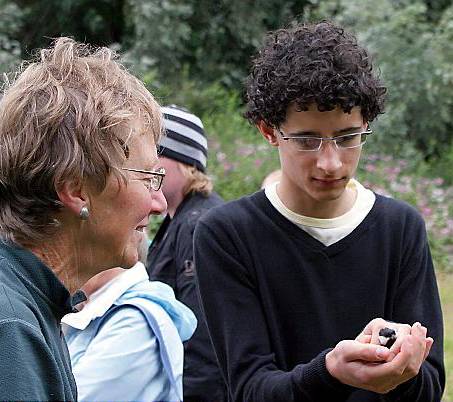Close encounters of the bird kind
Date published: 07 September 2009

GENTLY does it . . . Matthew Mankarious and Margaret Rawlins
FEEDING garden birds provides hours of interest and entertainment for many Oldhamers. But bird numbers are declining, and conservationists across the country are keen to harness the enthusiasm of bird lovers to help them find out why. This year, the British Trust for Ornithology is celebrating 100 years of bird-ringing. The practice helps track their movement, giving an insight to the seasonal comings and goings of migrant birds, and to the local movement of our own breeding birds. Reporter Marina Berry found out more.
AS dawn broke over Daisy Nook Country Park, a clutch of helpers from pensioners to tots huddled together waiting for instructions.
It was the park’s fourth annual August bird-ringing event and volunteers waited patiently as a fine mesh net was strung between two poles.
The next few hours saw birds trapped by the net carefully picked out and a ring put round a leg with a unique number, before being released back into the wild, none the worse for the experience.
The ringing scheme helps provide vital information on the nation’s bird population and means individual birds can be identified if they are spotted in the future.
Information collected helps conservation bodies monitor which species are declining or increasing and forms the basis of recommendations for policy changes to Government groups.
Twitchers have long been fascinated by the mammoth journeys undertaken by tiny birds in pursuit of survival.
It is a marvel that birds weighing less than an ounce, such as the chiff-chaff and willow warbler, make the hazardous 6,000-mile journey from England to South Africa and back every year.
Those breeds were among 44 birds ringed in the three-and-a-half hour early morning session at Crime Lake in Daisy Nook.
Others included the coal tit, long-tailed tit, great tit, blue tit, dunnock (pictured), blackcap, grey wagtail, bullfinch and robin. But there was no sign of the rare tree pippit ringed in 2006, or the wren, which has appeared in each of the last three years.
Only one in 50 birds which have been ringed are found and reported. The trust wants to improve on that number, saying every report is of value to experts trying to build up an overall picture of Britain’s birdlife.
The trust has a network of more than 2,400 trained and licensed volunteers who, between them, ring more than 800,000 birds every year.
The first ringed bird was a lapwing in Aberdeen, in 1909, since when more than 35 million birds have been ringed by British Trust for Ornithology volunteers.
Margaret Rawlins has been a volunteer ringer with the trust for eight years, and said it is one of her greatest pleasures.
She learned about the practice when she took part in an Earthwatch project in Bolivia — the organisation uses volunteers to conduct scientific field research to aid conservation.
“I found it fascinating to be able to see birds close up and to realise how the information was used to make population projections and understand migration patterns,” she said.
Margaret was among volunteers at Daisy Nook and is a regular at Woolston Eyes nature reserve in Warrington, where ringing takes place most Saturdays. She also rings regularly at her home in Oldham.
She said: “I still find it fascinating. One of the things that gives me a buzz is when you get an unexpected bird.
“The most unusual I have seen is a wryneck, a bird related to the woodpecker.
“I don’t think it breeds in this country any more, but I was lucky enough to see it on the south coast in Hastings.”
Oldham countryside warden Jane Downall is based at Daisy Nook and also took part in the ringing event, which she promoted as “Close Encounters of the Bird Kind”.
“The children who came absolutely loved it,” she said. “It was great experience for them to be able to get so close to wild birds and help in such an important issue.
“Ringing on a regular basis is really important. It shows how birds live, how far they travel and helps monitor the numbers of different species,” said Jane.
Find out how to become a volunteer by logging on to www.bto.org or by calling the trust on 01842-750 050.




